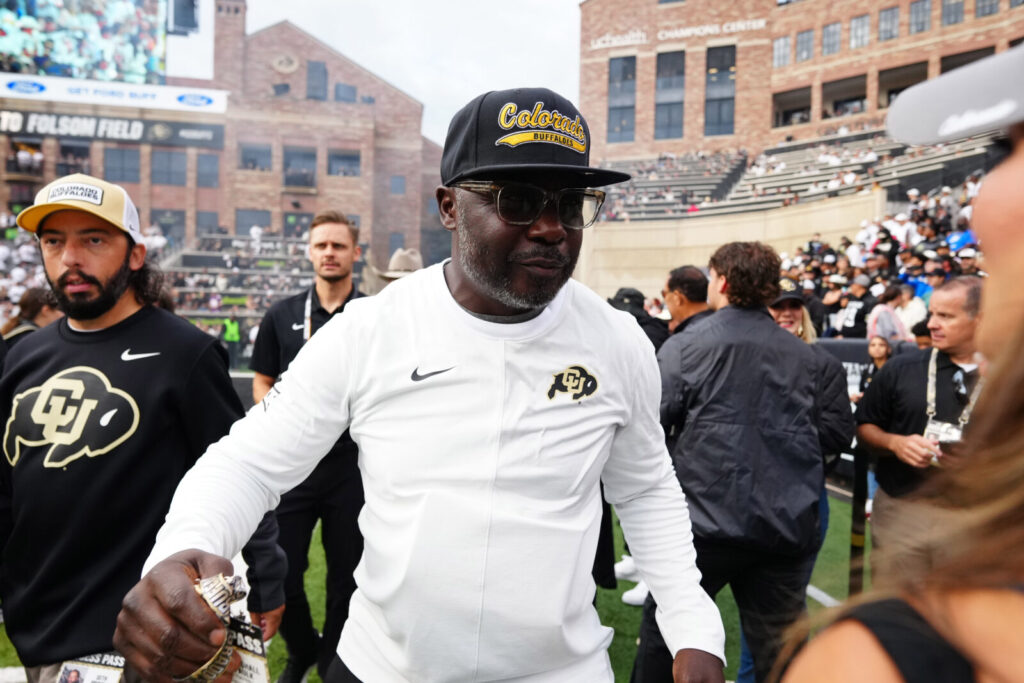Strike 1: There’s a quarterback controversy in Boulder. Most of those frustrated with the Colorado Buffaloes 1-2 start are pointing at that issue, that the lack of stability at the key position as the main culprit.
They would be incorrect.
Lost in all the hand wringing and message board complaints is this: Deion Sanders and his third Colorado Buffaloes coaching staff is woefully short on actual college coaching experience. That as much as anything could be contributing to the Buffs sluggish start.
Everyone knows that offensive coordinator Pat Shurmur has been around forever, as in 37 years. But prior to his arrival in Boulder he hadn’t coached a college kid since Bill Clinton was the POTUS. And he has the most “college” experience on the staff.
Sanders has opted for sizzle over substance when it comes to hiring assistant coaches. He wants guys with rings, not resumes. To that point, you might expect that a staff with three Pro Football Hall of Famers would be exactly what a program like CU needs. Then again, you’ve probably never heard the old saying, “those who can, do…and those who can’t, teach.”
While Travis Hunter may have had the same level skill set Deion had when each entered the NFL, that’s an exception to the rule. It’s more like 99 times out of 100, the guys who running backs coach Marshall Faulk and defensive “pass rush” coach Warren Sapp get to coach when they arrive on campus don’t have anywhere near the same set of skills those Hall of Famers had. Talk about things getting lost in translation.
Being a great player more often than not does not lead to being a good coach. Big stars in all the sports have flopped as head coaches. For every Steve Spurrier there are a dozen Magic Johnsons, Larry Birds, Wayne Gretzkys, Mike Singletarys, Isiah Thomas and Herm Edwards – who most recently tried to bring the “Let’s bring the NFL to college football” thing at Arizona State, and lasted exactly four losings seasons.
Sanders likely knew all this before he went into coaching, first very briefly at the high school level and then the FCS level at Jackson State. He clearly went in fully intent on being a “CEO” type HC, not someone who had to teach, but rather someone who had to organize the talent on hand. He’s made no secret of the fact that he wants to instill an professional football model in Boulder, and given the college game’s trend in that direction with NIL, revenue sharing and what amounts to year-by-year free agency, you can understand why. But there are significant differences in the game at the pro and college level, mainly in the area of player development. Players arrive in the NFL as close as possible to being “finished products.” In college? It’s about coaching. It’s the assistant coaches that have to do most of the glamour-less player development stuff.
Sanders didn’t arrive in Boulder intent on “development.” His approach was much more an immediate reward type, NFL-style, which lent itself to an emphasis on the Transfer Portal. The idea is to let these kids go somewhere else to get a feel for the college game, and when they’re ready, we’ll grab ‘em in the portal.
It worked, sort of, when Deion brought his two sons, Heisman winner Travis Hunter and others in his orbit with him from the FCS ranks via the portal. High school recruiting has and continues to take a back seat. Now that the first wave of standout transfers are gone, what’s left of the roster screams out to be “coached up.”
That doesn’t appear to be happening.
Put the lingering QB issues and the complaints about Shurmur, who’s in charge of the offense, off to the side for a moment. The rest of the offensive staff includes Faulk, who, for all his greatness as a player, arrived in Boulder with zero coaching experience. None. Now he’s in charge of coaching the running backs.
How’s that running game looking?
Offensive line coach Andre Gurode was a four-year starter and All Big 12 performer for the Buffs from 1998-2001. After an NFL career that spanned more than a decade, he spent a season as a defensive assistant in Dallas before becoming an offensive line coach in the UFL for two seasons. Then Deion snatched him up. He’d never coached a college kid before. And the o-line is struggling. Again.
Observers of the Buffs through three games have seen a defensive line that is coached by assistants Domata Peko and Sapp. Sapp of course is also a member of the Pro Football Hall of Fame for his outstanding playing career. Yet he too arrived in Boulder with zero coaching experience. Currently, he’s listed as “defensive pass rush coordinator.” How’s CU’s pass rush doing?
Peko is the defensive line coach. He had an excellent 15-year playing career in the NFL. And yet he’s another former NFL standout who came to CU having never coached before. CU’s d-line play thus far has left a lot to be desired.
What Sanders hasn’t grasped is that with a few exceptions, college football players are not finished products when they arrive on campus. As great an allure as it might be to have guys like Marshall Faulk and Warren Sapp on hand to great new recruits, it’s more important that those in charge of player development actually have experience in how to develop players.

